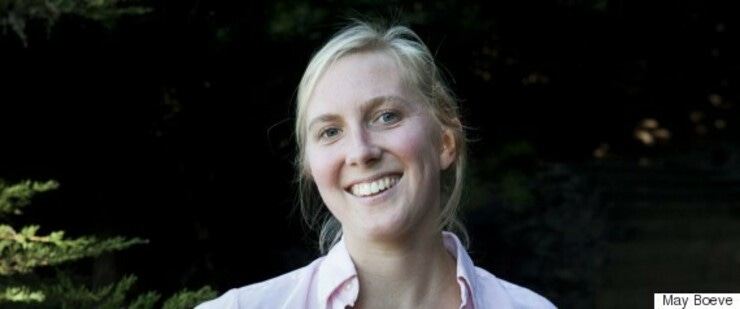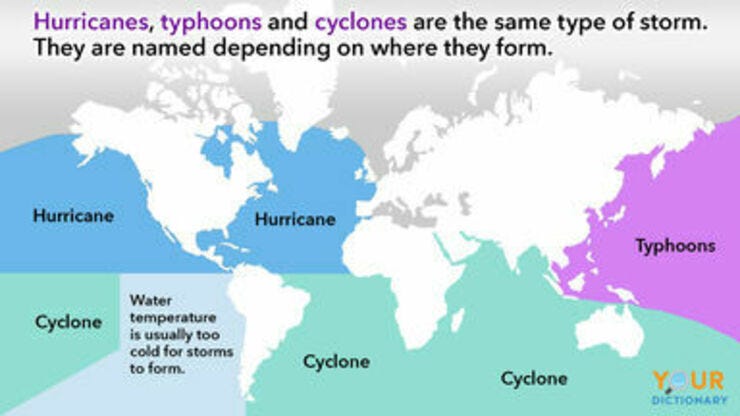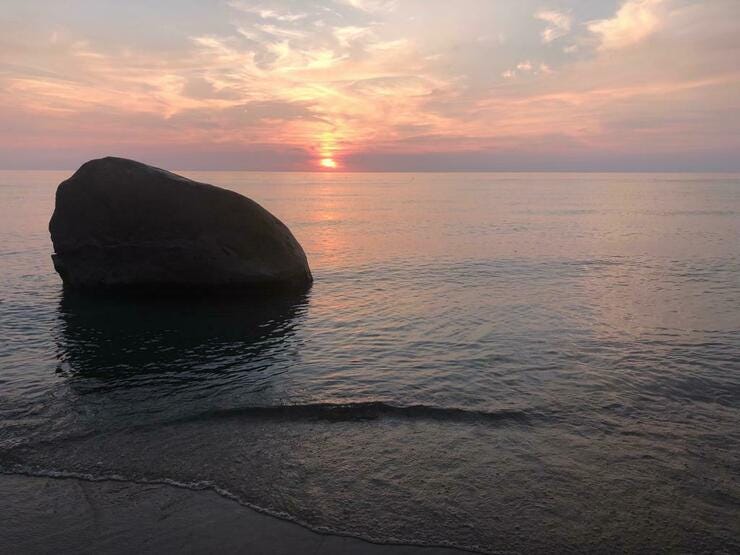Refugia Newsletter #24 by Debra Rienstra: climate megadonors, big oil lies, Black Detroiters outdoors, and beavers
Refugia News
Last time I announced the release of the Refugia Podcast Season 3 coming up on September 18, and I'm pleased to report: it worked! I'm always half amazed that all these different programs and tools we use to create the podcast actually do their jobs and the thing is now out there.
I hope you'll listen, since my guests are wonderful folk doing good work in the world, and they have such wise things to say. This week's episode (dropping Sunday am early): May Boeve, co-founder of 350.org. She doesn't often get to talk about her faith, but she did with me, and I'm so grateful.
Shout-out, too, to the two Calvin University students--Ian Gilbert and Kathryn Gardner--who are helping with the audio editing for the podcast, and to recent Calvin grad Michal Rubingh who is helping out with transcript editing. And to the Calvin Center for Christian Scholarship, which contributed a grant to the podcast project so I could pay my helpers. We don't have the cast of thousands to make this thing that really professional podcast do. But we get the job done.
This Week in Climate News
This summer's serious weather events keep coming, with hurricane Fiona hitting Puerto Rico only five years after the devastating Maria. I don't mean to ignore this story, but I expect you've been hearing about it in the news with ample coverage.
We did have a conversation at the dinner table this week, trying to sort out the distinctions between hurricanes, typhoons, tsunamis, cyclones, etc. We live in a world now where, unfortunately, we need this vocabulary more often. Here's a helpful map my daughter-in-law found to get at least some of this sorted out:
Pakistan and Puerto Rico are just this month's stories of devastation. So many vulnerable people are struggling to survive, to rebuild their lives. So many of these people are already poor, or at least under-resourced. What can "resilience" even mean if your homeland gets pummeled repeatedly by severe weather events? This is the question aid groups and governments--all of us--will have to face.
While vulnerable people suffer and struggle, what are the rich and powerful up to? That's the theme this week.
Under that heading, I thought I would highlight the story of Yvon Chouinard, the founder of outdoor outfitter Patagonia, and his remarkable decision to essentially give away his company. Chouinard, who is 84 and has always been far more interested in adventuring outdoors than in being wealthy, has placed all of his company's shares, worth about $3 billion, in a nonprofit trust (2%) and in the Holdfast Collective (98%), an entity created to funnel the company's approximately $100 million annual profits into environmental work.
What Chouinard says about this action is just as remarkable as the action itself. He could have sold the company and donated the money, but, he said, "Even public companies with good intentions are under too much pressure to create short-term gain at the expense of long-term vitality and responsibility.”
By his decision, he hopes he "will influence a new form of capitalism that doesn’t end up with a few rich people and a bunch of poor people."
And I really love this one: “Instead of extracting value from nature and transforming it into wealth for investors, we’ll use the wealth Patagonia creates to protect the source of all wealth.”
He's imagining a different answer to the question, What is a business for?
Is there such a thing as peer pressure among billionaires? Well, the day after the Patagonia news was announced, I noticed this article on Lululemon Athletica founder Chip Wilson, who has pledged $100 million (Canadian) to buy and preserve wilderness in British Columbia.
Robert Tuttle of Bloomberg News reported that “The money will be used by the B.C. Parks Foundation to buy forests and repurchase mining, forestry and other resource licenses, turning 'massive amounts of land' into parks that indigenous groups would manage and use for revenue-making purposes such as tourism, Wilson said in an interview.”
Wilson's goal is to preserve 25% of BC's land and water. Read a little deeper in the article, though, and you realize that Wilson seems pretty OK with continued fossil fuel projects in B.C. So not quite as visionary as the Patagonia guy, I guess.
Do other billionaires support climate mitigation and conservation and other environmental causes? Sure. This article by David Gelles of the New York Times lists some big donations by some big donors in order to give context to the Chouinard story. Gelles also points out that Chouinard's strategy not only has tax benefits for the family, but also allows for using some of the money to be used politically to influence climate policy. The financial and legal arrangements are not shockingly new--the big difference is the main purpose to which the money will be put: "protecting the source of all wealth," i.e., the earth.
Deeper Dive
More on wealth and power. In the past couple weeks, we've been reminded once again that part of the fossil fuel industry's power is what we call in literary studies "discursive hegemony." In other words, Big Oil has been able to use their unbelievable power to control discourse on the climate crisis. Or at least confuse it.
The House Committee on Oversight and Reform held hearings last week to try to get after the major fossil fuel producers for misleading the public not only about the facts of climate change but about their own efforts to transition into alternative energy companies. No surprises: internal documents contradict the public-facing communications.
Here's the "money" (ha!) quote from the New York Times coverage:
“These and other documents, reviewed by The New York Times, come from a cache of hundreds of thousands of pages of corporate emails, memos and other files obtained under subpoena as part of an examination by the House Committee on Oversight and Reform into the fossil fuel industry’s efforts over the decades to mislead the public about its role in climate change, dismissing evidence that the burning of fossil fuels was driving an increase in global temperatures even as their own scientists warned of a clear link.” [emphasis added]
Here's another fun excerpt from the NYT piece: "The Shell internal documents discussing the company’s 'net zero' pathway also included guidelines for employees that stated, 'Please do not give the impression that Shell is willing to reduce carbon dioxide emissions to levels that do not make business sense.'”
A good summary of this story appears in Inside Climate News. Money quote from this article:
"Richard Wiles, president of the Center for Climate Integrity, an advocacy group that works to hold fossil fuel companies accountable for climate change, said the documents could help make the case that oil companies are continuing to mislead the public. The release of the documents, he said, 'went a long way to establishing the fact that all their current posturing on net-zero and investments in renewables is just the latest form of lying they have come up with.'" [emphasis added]
Meanwhile, at the UN, UN General Secretary Antonio made a searing speech on Sept. 20. The whole thing is well worth reading. But here are some harsh words for the fossil fuel industry:
"Let’s tell it like it is. Our world is addicted to fossil fuels. It’s time for an intervention. We need to hold fossil fuel companies and their enablers to account. That includes the banks, private equity, asset managers and other financial institutions that continue to invest and underwrite carbon pollution. And it includes the massive public relations machine raking in billions to shield the fossil fuel industry from scrutiny. Just as they did for the tobacco industry decades before, lobbyists and spin doctors have spewed harmful misinformation. Fossil fuel interests need to spend less time averting a PR disaster – and more time averting a planetary one." [emphasis added]
Among other things, the Secretary called for windfall taxes on the industry.
Honestly, Big Oil's misinformation, denials, and misleadings are not really news. The Congressional hearings are just another exposure that probably won't result in much except public awareness--which isn't nothing!
Here's what's even more horrifying to me: the way that Big Oil has lavishly funded third parties to do the deceptions for them, including by leveraging religious influencers who can sway their followers to believe falsehoods with biblical and theological claims. I refer in Refugia Faith to this chilling 2017 piece by Brendan O'Connor in Splinter News, but I just keep coming back to it. O'Connor has followed the money and watched it funnel through Christian organizations and into political influence. It's an insidious web. There's a chart. Check it out.
The NAE did eventually endorse climate action in 2015. But it was too late. By that time, a corps of right-wing Christians, funded by fossil-fuel interests, had hijacked the public and political machinery of the evangelical movement.
Refugia Sighting
That's enough of a dive into money and power. Let's shift to places where refugia are happening. Two fun stories today: an organization dedicated to helping Black Detroiters enjoy the outdoors and... beavers!
An article in Planet Detroit by Rukiya Colvin celebrates Ian Solomon, a Detroiter who founded Amplify Outside, tagline "Black Recreation is Black Liberation.”
Solomon himself came late to outdoor activities like camping and hiking, and wanted to find a way to empower other Black residents of the Detroit area to enjoy Michigan's wonders. Surveys he performed confirmed what he suspected: Black Detroiters are often uncomfortable in the "White spaces" of outdoor recreation. And they sometimes lack access or equipment. Amplify Outside, along with a few other similarly minded groups, are helping to change that, partly simply by bringing people together to go kayaking or fishing or whatever, building skills and camaraderie.
Thanks to reader Nate Rauh-Bieri who sent me two delightful stories about beavers performing essential ecosystem engineering--in ways that can help us learn about climate resilience. Beavers create refugia, basically, and they can teach us how to do it, too.
Specifically, their damming practices create habitat for numerous other creatures, cool and slow down water, cool down the air even (!), and create areas resistant to wildfires. This article in Vox by Benji Jones explains: and features absolutely adorable photos of the furry little engineers.
That's not all! Nate also sent a link to this little video by Dr. Emily Fairfax, an ecohydrologist who teaches at California State University Channel Islands campus. She created this informative video to explain what beavers are up to. Happily, it also features a very cute beaver bustling about doing her thing.
The Wayback Machine
That was plenty for one newsletter, eh? Next time, I'll have a bunch of good news for you and some advice about where to find more good news.
For now, just a beautiful photo of sunset over Lake Michigan, taken by Marchiene Rienstra, my mother-in-law. These lakeshore beauties just never get old.
Thank you!
Thanks for reading! I keep these newsletters quickly scannable, with opportunities for deeper reading as you are able. I also tend to emphasize the connections between faith communities and climate action.
You can send me a response to this newsletter simply by replying to the email that brought it to you. If you are so inclined, please follow me on Twitter or Facebook @debrakrienstra. You can always contact me on those platforms, too. Also check out my website at debrarienstra.com.
If you like this newsletter, please share with others!






